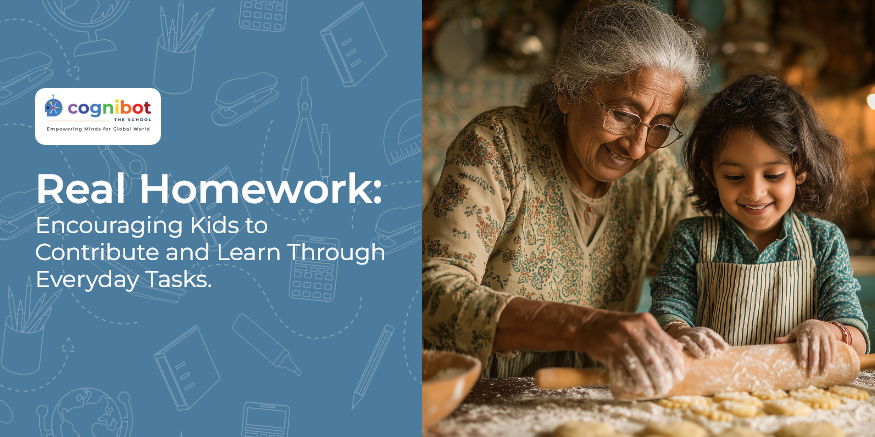Real Homework: Encouraging Kids to Contribute and Learn Through Everyday Tasks
At Cognibot – The School, we believe that real learning extends beyond classrooms and textbooks. That’s why we encourage children to engage in what we call ‘Real Homework’ — a hands-on approach to learning through age-appropriate household chores. It’s more than just helping around the house; it’s about fostering responsibility, confidence, and empathy in children while strengthening family bonds.
Why Real Homework Matters
Engaging children in household tasks isn’t just a way to keep the home running smoothly — it plays a vital role in shaping their character and nurturing life skills that last a lifetime. Studies show that children who regularly participate in chores develop a greater sense of responsibility and accountability. When children help set the table, water the plants, or organize their toys, they begin to understand that their contributions matter. This instils a sense of achievement and boosts their self-esteem.
Moreover, accomplishing these small tasks fosters independence. Kids learn to rely on themselves, gaining the confidence to tackle bigger challenges as they grow. Each time they complete a task — no matter how simple — they experience the satisfaction of a job well done.
Real Homework also strengthens a child’s time management and organizational skills. When children are given chores with specific timelines — like making their bed before breakfast or tidying up their study space — they learn how to prioritize tasks and manage their time effectively. These skills will be crucial as they navigate school projects, extracurricular activities, and eventually, their professional careers.
The Power of Family Time
Real Homework goes hand in hand with quality family time. Whether it's cooking a meal together, sorting laundry, or cleaning up after dinner, these moments create a sense of togetherness and belonging.
Spending meaningful time with family helps children develop crucial social skills — like communication, cooperation, and conflict resolution. It also deepens their emotional connections, giving them a sense of security and support that extends beyond the household.
When children observe how family members interact, they gain valuable insights into relationship dynamics. They learn about empathy, respect, and teamwork — lessons that will help them build strong relationships not just within the family but in their friendships and future careers.
Family activities, like planning meals or organizing weekend clean-ups, also teach children the importance of planning and teamwork. Working together towards a common goal — be it a spotless living room or a homemade dinner — helps children appreciate collaboration and shared responsibility.
Backed by International Research
Research confirms the long-term benefits of involving children in household chores. Studies reveal that children who rarely do chores are more likely to score lower in prosocial behaviour, academic ability, peer relationships, and life satisfaction compared to those who regularly pitch in at home.
Psychologists worldwide emphasize that shared responsibilities cultivate a sense of belonging and self-worth. When children contribute to the family’s daily routine, they start to recognize the needs of others and shift from self-centeredness to a more empathetic mindset.
As their cognitive abilities grow, so does their understanding of how interconnected family members are. This realization reinforces the concept of teamwork and cooperation — essential skills that lay the groundwork for success in both academics and future professional environments.
Furthermore, studies have shown that children who consistently perform household chores demonstrate better academic performance. The discipline, focus, and sense of responsibility developed through chores translate into their study habits, helping them stay organized, meet deadlines, and tackle academic challenges with confidence.
Building Values and Life Skills
Through Real Homework, children don’t just learn how to sweep a floor or fold laundry — they build a strong foundation of values and ethics. They come to understand the importance of:
- Hard work and perseverance: Tasks teach kids that effort leads to results.
- Cooperation and teamwork: Working with family members shows them how collaboration works.
- Prioritizing relationships: They learn to value emotional connections and support systems.
- Empathy and compassion: Understanding that every family member has a role fosters kindness.
- Problem-solving: Handling minor challenges during chores — like figuring out how to stack dishes or organize toys — boosts critical thinking skills.
These qualities nurture well-rounded, resilient individuals who are better equipped to face life’s complexities with empathy and confidence.
Empowering Your Child for the Future
As a parent, your ultimate goal is to raise independent, happy, and successful children. Encouraging Real Homework is a powerful way to support that goal. By striking a balance between nurturing their emotional well-being and teaching practical life skills, you’re setting your child up for lifelong success.
Remember, every small task contributes to their growth. Whether it’s folding clothes, setting the dinner table, or sweeping the floor — they’re not just doing chores. They’re learning responsibility, building confidence, and strengthening family bonds.
At Cognibot – The School, we champion this holistic approach because we know that true education happens when children grow both academically and emotionally.
Let’s raise children who don’t just succeed in school but shine in life. Let’s embrace Real Homework!
